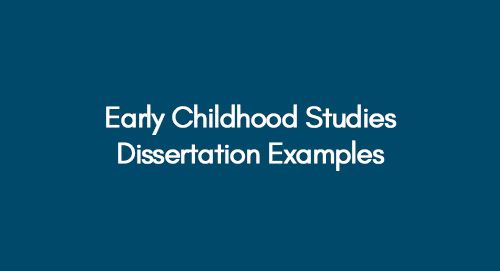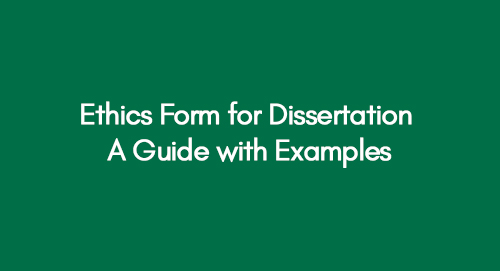
Literature Review Dissertation Examples | Review and Download
February 14, 2023
Dissertation Abstract Examples
February 14, 2023Writing a dissertation for your early childhood studies degree can be exciting yet daunting. It requires evidence-based research, critical thinking, and meticulous organization. Many students find that writing a dissertation can be puzzling, but with the right approach, it doesn't have to be.
Crafting the perfect dissertation which stands out from the pack and is something you can be proud of for years to come can be done only when you have proper field knowledge and writing skills. Let's break down how to write a winning dissertation.
We will also share some early childhood studies dissertation examples and inspiring dissertation topics in early childhood studies that can help build a strong foundation for future generations. So, make sure to check out the whole article.
Example: 1 Insight into Alternative Dispute Resolution and Its Execution
Example: 2 Influence of Socio-Physical Attributes on Individual's Weight
How to Structure Your Early Childhood Studies Dissertation
1. Introduction
The first step to writing a great Early Childhood Studies dissertation is to craft a compelling introduction. The introduction should provide an overview of your topic and explain why it is important. Additionally, the introduction should state your thesis statement, which is the main argument of your paper.
Click on the link below for a detailed guide on how to write an introduction.
2. Literature Review
The next step is to write a literature review. In this section, you will need to discuss the existing research on your topic. It will involve reading and summarizing scholarly articles and books. You will need to critically evaluate the existing research and determine what gaps exist that your research will aim to fill.
Click on the link below for a detailed guide on how to write a literature review.
3. Methodology
After the literature review, you will need to describe your research methodology. It will entail describing the data collection and analysis procedures you'll use for your project. For instance, if you're doing a case study, you'll need to explain how you'll choose your participants and what information you'll gather from them.
Click on the link below for a detailed guide on how to write methodology in a dissertation.
A Quick Guide on How to Write the Methods Section in Academic Writing
4. Results
Once you have collected and analyzed your data, you will need to present your results in this section of your dissertation. Be sure to clearly explain what your results mean and how they contribute to the existing body of knowledge on your topic.
Click on the link below for a detailed guide on how to write results in a dissertation.
How to Write a Results Section. Tips and best practices
5. Discussion
In the discussion section, you will need to interpret your results and discuss their implications. You will also need to address any limitations of your study and suggest future research directions.
Click on the link below for a detailed guide on how to write a discussion in a dissertation.
Expert Tips to Write an Effective and Concise Discussion Section in Research
6. Conclusion
Finally, you will need to compose a conclusion summarising your paper's main points and reiterating your thesis statement.
Click on the link below for a detailed guide on how to write a conclusion in a dissertation.
Step-By-Step Guide for Early Childhood Studies Dissertation
Step 1: Brainstorm Ideas
The first step to writing a great dissertation topic is brainstorming ideas. To begin, consider the early childhood studies topics that have interested you most in school or during work experience placements.
- What topics have resonated with you?
- What themes have kept coming up throughout your studies?
- Could these ideas be further explored and developed into potential dissertation topics?
Consider what research gaps are in the field, and think about how you could fill one of these gaps with your work.
Step 2: Do Your Research
Once you've narrowed down some potential ideas, it's time to research! Start reading papers related to those topics and take notes on what has already been done, as well as any new questions or possibilities for further exploration that arise along the way.
Don't forget to look at books and other sources, too—you may find some interesting new perspectives outside academic journals. Also, don't forget to talk to your professors or advisor; they may have helpful insights or suggestions that can help refine your topic further.
Step 3: Make It Unique
Finally, make sure that whatever topic you decide on is unique enough to stand out from other dissertations in the field. Think about how you can add something fresh and exciting to the conversation around early childhood studies:
- What angles still need to be explored?
- What questions remain unanswered?
- Is there anything else groundbreaking or innovative that hasn’t been tried before?
If so, this could be a great opportunity for you to make an impact with your work!
Compelling Early Childhood Studies Dissertation Examples and Ideas
From advances in technology to changing social dynamics, countless fascinating topics can form the basis of your dissertation. Here are some inspiring early childhood studies dissertation examples and ideas to help get you started.
- The Impact of Technology on Early Development
The rapid technological advances over the past two decades have profoundly impacted early childhood development. From smartphones and tablets to virtual reality and voice-controlled devices, young children today are growing up with unprecedented access to digital technologies.
- But how does this affect their development?
- What are the long-term impacts of growing up with such advanced technologies?
- And what role should parents and caregivers play in helping young children navigate these technologies safely and responsibly?
These are a few questions you could explore when writing an early childhood studies dissertation on the impact of technology on early development.
- Exploring Social Dynamics in The Early Years
- What is it like for young children growing up in different socioeconomic contexts?
- How do their experiences differ, and what impact do they have on their later life outcomes?
- Are there any patterns or trends emerging among today's generation of young children that we can learn from?
When exploring social dynamics in early childhood studies, consider looking at things like family structure, educational opportunities, cultural influences, neighbourhood resources, and more. By taking a closer look at these issues, you'll gain insight into what it takes to provide all children with equal opportunities for growth and success.
- The Role of Play in Early Childhood Education
The play has always been an important part of child development—but why is it so important?
- What type of play activities should be encouraged by parents and educators alike?
- How does play contribute to cognitive development and emotional well-being in young children?
- What role does creativity play in learning processes?
You might look at these and other issues when writing a dissertation on the topic of play in early childhood education. You will be able to gather important information on how we can help our youngest students more effectively during their formative years by digging deeply into this topic.
Check out this complete yet brief early childhood studies dissertation example to get an idea of how things should be done and structured.
Title: "The Impact of Family Involvement on Early Childhood Education"
a. Abstract
This dissertation explores family involvement's impact on early childhood education. The study will use a mixed-methods approach, including qualitative and quantitative data collection methods, to gather information from parents and teachers. The study will examine how families can support their children's learning and development and the benefits of family involvement in early childhood education. The study will also identify the barriers preventing families from actively participating in their children's education and offer recommendations for improvement. The results of this study will contribute to a better understanding of the role of families in early childhood education and provide practical insights for educators, policy-makers, and parents.
b. Introduction
Family involvement in early childhood education has been widely recognized as important in promoting children's learning and development. However, despite recognizing its importance, the level of family involvement in early childhood education remains a challenge. This study aims to explore the impact of family involvement on early childhood education and identify the barriers that prevent families from being actively involved in their children's education.
c. Methodology
This project will use a mixed-methods strategy to collect qualitative and quantitative data. Focus groups, interviews, and internet surveys will all be used as data-collecting techniques. Parents and instructors from various racial and socioeconomic backgrounds will make up the sample.
d. Data Analysis
The data collected through the various methods will be analyzed using both qualitative and quantitative methods. The qualitative data will be analyzed through thematic analysis, and the quantitative data will be analyzed using descriptive statistics and regression analysis.
e. Expected Results
The results of this research are expected to provide insights into the impact of family involvement on early childhood education and the barriers preventing families from actively participating in their children's education. The study will also provide practical recommendations for educators, policy-makers, and parents on how to promote family involvement in early childhood education.
f. Conclusion
Family involvement in early childhood education is important in promoting children's learning and development. This study will contribute to a better understanding of the role of families in early childhood education and provide practical insights for those who work with young children. The results of this study will provide valuable information to support the development of policies and practices that promote family involvement in early childhood education.
Early Childhood Dissertation Topics
Title: The impact of family involvement on early childhood education
Research Aim: Family involvement is crucial in the development of young children. A dissertation on the impact of family involvement on early childhood education can explore how families can support their children's learning and development. The study can also examine the benefits of family involvement and the barriers preventing families from actively participating in their children's education.
Title: The effectiveness of different early childhood education programs
Research Aim: Various early childhood education programs are available, each with a unique approach to learning and development. A dissertation on the effectiveness of different early childhood education programs can examine the pros and cons of each program and compare their impact on child development. The study can also identify best practices and recommendations for early childhood education programs.
Title: The importance of diversity and inclusion in early childhood education
Research Aim: Diversity and inclusion are critical aspects of early childhood education. A dissertation on the importance of diversity and inclusion in early childhood education can explore the impact of diverse and inclusive environments on child development and learning. The study can also examine the challenges of creating and maintaining diverse and inclusive classrooms and offer recommendations for improvement.
Conclusion
Writing your dissertation is an exciting opportunity to dive deep into a subject that interests you while also making an important contribution to your field of study. With so many fascinating topics related to early childhood studies available for exploration, there's sure to be something that sparks your curiosity!
You can also get in touch with our professionals at Premier Dissertation to get more assistance; if you need to know more about dissertation writing, check out the links given below.
- Structuring Literature Reviews: A Guide on How to Structure a Literature Review for Success
- How to Write a Reference List? Practical Tips and Guidelines
- Expert Tips to Write an Effective and Concise Discussion Section in Research
- How to Cite Your Sources. A Practical Guide
- How to Write Acknowledgement: Tips with Examples
Get an Immediate Response
Discuss your custom requirements with our writers
Free Online Plagiarism Checker For Students
We will email you the report within 24 hours.
Upload your file for free plagiarism





























